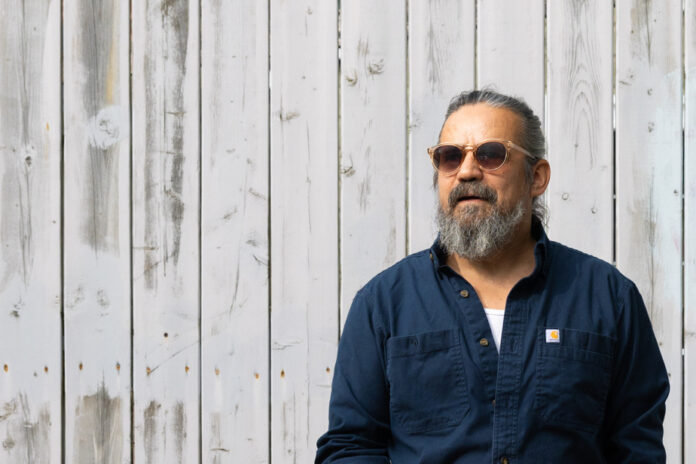For Robin Aubert, poetry is the art form that speaks the most truth. Conversation around his 36 series B poems.
One day, Robin Aubert attends an evening meeting at Armand Vaillancourt’s with the psychomagical Chilean filmmaker Alejandro Jodorowsky. “At one point,” says Aubert, “I found myself face to face with Jodorowsky, to whom I said: ‘I feel blocked. Am I an actor, director, poet?” He answers me: “You are in front of a marble wall. What are you going to do to get out of this?” Well I’m going to hit, hit. He replies: “You just have to do that.” »
That ? Robin gets up from the table and mimes a sort of little ballet step, reverence. Understand: There is no better attitude to adopt towards the marble wall than to ignore it. The marble wall is perhaps, in any case, only a figment of the mind.
It was only during the creation of À l’origine d’un cri (2010), in which his character Hugo (Patrick Hivon) dabbles in poetry, that Robin Aubert gave himself permission to write more and, above all, get her read. “But the poetry was always there,” says the man who, as a young adult, at the Cascades factory in Kingsey Falls, read Les Fleurs du mal during his breaks.
Despite two collections (Between the city and the bark in 2011 and El beso del amor in 2014), poetry nevertheless remains an intimate affair for him, about which he thinks a little all the time, but which he does not necessarily talk about around a drink with his friends.
“A poem lessens the heaviness of gray clouds/A poem bows out in the face of imbecility//A poem charges its peaks on hatred/A poem weakens death//A poem makes nostalgia seem like a dream,” writes- he in 36 poems from series B, a title full of self-deprecation, testifying to his desire to clear himself in the face of established poets and to point out that it is in the apparently-not-poetic-at-all that he draws his inspiration poems.
In 36 series B poems, Robin Aubert investigates a disappearance with Jack Nicholson, observes his daughter hugging a tree, weighs the beauty of the obsolete word, remembers a slice of pizza eaten in Texas, apologizes to his friends that he doesn’t see often enough and thinks of the foghorn that, as a child, brought him so much joy.
Between Ibiza and Ham-Nord, Lafayette and Verdun, the 51-year-old also takes the time to greet the poets Maude Veilleux and Patrice Desbiens.
Desbiens also remains the most significant influence on his work, if only in the humility with which he climbs on the horse of writing. “I don’t make poems/I describe places […]/I place images that intertwine themselves/Without much effort/They’re big girls,” he swears.
Which is both true and false. Because if his poems indeed flow by themselves, our man does more than simply describe places or memories. In the manner of his favorite author, Blaise Cendrars, Aubert pretends to name the surroundings, while he always talks a little about his interior life and manages in one verse, like the surrealists, to “open into the spirit of reader a drawer that he doesn’t open often, just long enough to see if there are any stars in there.”
In 1995, Robin Aubert played a boxer from Sudbury in the play Eddy by Jean-Marc Dalpé. A good disciple of the Actors Studio methods, the young theater graduate drove to Sudbury, where he was welcomed by the late poet and professor Robert Dickson (one of the three Ds of Franco-Ontarian poetry with Dalpé and Desbiens). , who speaks to him about the truth of poetry.
Robin Aubert was born in Ham-Nord, in Centre-du-Québec, but has something of a Franco-Ontarian poet, to the extent that, as he says, “Franco-Ontarian poetry is earth down to earth and at the same time, it’s jazzy. You hear the drums and the cymbals in the back.”
Who does Robin Aubert write for? For him, first and foremost, because poetry alleviates his pain, big or small. Robin Aubert also writes for her aunt Marcelle, even if she is no longer with us. “My aunt Marcelle had put my collection on her toilet bowl and that’s where she read to me, one poem at a time. There is always a part of me that writes for those who put poetry on their toilet bowl. »

